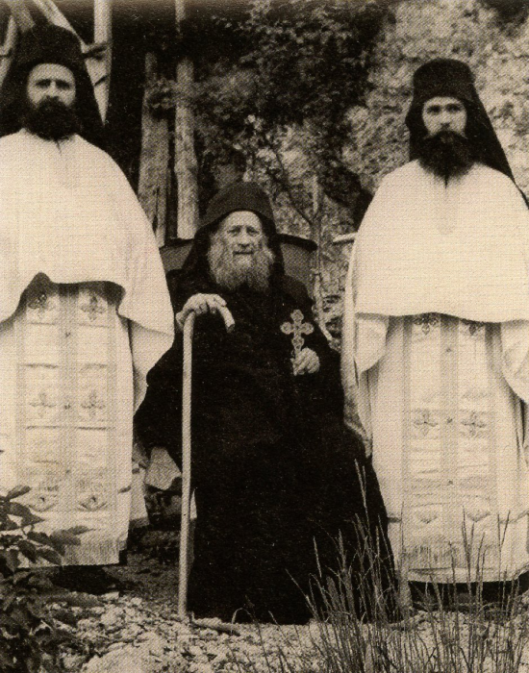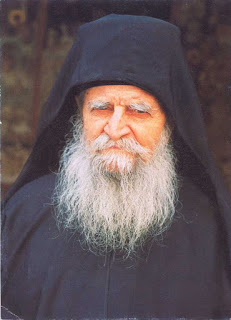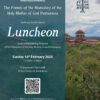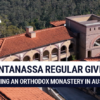
Often, we think that to live a holy life in today’s world is impossible; so impossible that really only Jesus could do it. We forget that after His ascension, Jesus sent us the Holy Spirit to give us the strength and the grace to live lives dedicated to Him. He gave us the Church so that we could live together as His Body and the Holy Sacraments to continuously re-charge our spiritual batteries.We also forget that in the Orthodox Church we have modern day saints. Saints whose lives resembled our own or who faced similar concerns, temptations, or circumstances as we have. Think of some of the saints who were alive in the last century, like St. Arsenios of Cappadocia +1924, St. Nektarios of Aegina +1920, St. George Karslidis of Drama +1959, St. Maria Skobtsova of Paris +1945, St. Elizabeth the New Martyr +1918, and St. Philoumenos of Jacob’s Well +1979. And then there’s even more recent saints like St. Porphyrios +1991 and St. Paisios +1994 (both of Mount Athos). There are more modern day men and women who lived holy lives and have not as yet been recognised as saints.
Many people, from all classes of society, married and unmarried, flocked to elder Haralambos, due to his reputation as a teacher of the noetic prayer (the Jesus Prayer).
He would often say about the Jesus Prayer:
‘We say that noetic prayer is for all Christians. Noetic prayer is also called prayer of the heart. You ask if oral prayer can also be called prayer of the heart. If prayer is not pure, neither noetic nor oral prayer can be called prayer of the heart. Prayer of the heart is the prayer where the mind is literally swallowed up by the heart. Bombs can be falling, the house burning; the mind has no intention of leaving the heart, even if it’s in danger of burning. That’s why we must also cultivate the virtues, and unceasing prayer. As much as we can, never stop saying, “Lord Jesus Christ have mercy on me” orally and from the heart. When you get used to saying constantly, “Lord Jesus Christ have mercy on me,” then you are sweetened so much that you are drawn to say this little prayer constantly. You don’t feel hungry, nor do you want to talk, or say anything else.’
In other words, the elder is saying that my practice of the Jesus Prayer, whether verbally or with the mind, will only grow into my heart when it is accompanied by my daily personal struggle to live according to God’s will and when I limit vain distractions. Once a young prospective monk visited elder Haralambos with his spiritual father, father Savvas. This young man asked for advice on the Jesus Prayer from the elder. They stayed together for quite a while and then the young man left with father Savvas to visit other Holy Monasteries. The next day, from the first break of light, the young man quickly returned from the Holy Monastery of St Paul and knocked on the elder’s door.
The elder opened the door:
What’s wrong, my child? Elder, I want to tell you something important. When we left, yesterday, I followed your advice and started constantly saying the prayer out loud. In the evening, I felt a strong burning flame in the centre of my heart, which brought on such inwardness and sweetness that I thought my mind had been swallowed by my heart. I stayed with my mind in my heart, for a long while. It didn’t want to come out from there. From then on, the prayer has gained such strength that it won’t even stop for a second. Well, when the elder heard that, with his usual child-like simplicity, he hugged and kissed the young man with tears. He then recommended that, instead of going around on pilgrimages, he stay with them so that he could keep and increase that which God granted him. Unfortunately, the young man was not able to leave his companion, the spiritual father.When he had another opportunity, he hurriedly returned to New Skete to see the elder before leaving the Holy Mountain. He confessed that, although he was still able to keep hold of unceasing prayer, the flame had been diminished because of the visits and the distractions, which was largely expected. Nevertheless, the elder called him a “thief”. ‘He came here; he stole noetic prayer and left.’ My dear friends, the above story took place in our times. That young person could have been one of us and… could still be anyone of us for the ‘Spirit breathes where it wants to’ (John 3:8) even in down under Australia.






Hello. I am writing to you for a copy of the Jesus prayer and instructions on how to use the prayer rope. Where can i get this prayer rope??